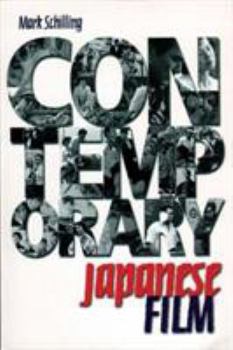Contemporary Japanese Film
Select Format
Select Condition 
Book Overview
This comprehensive look at Japanese cinema in the 1990s includes nearly four hundred reviews of individual films and a dozen interviews and profiles of leading directors and producers. Interpretive... This description may be from another edition of this product.
Format:Paperback
Language:English
ISBN:0834804158
ISBN13:9780834804159
Release Date:November 1999
Publisher:Shambhala
Length:400 Pages
Weight:0.50 lbs.
Dimensions:1.0" x 6.0" x 9.0"
Customer Reviews
3 ratings
Thought Provoking
Published by Thriftbooks.com User , 22 years ago
The Japanese reporter for the prestigious Screen International, Mark Schilling gets to see all the new films in advance, and brings not just a reviewer's critical eye, but a linguist's critical ear = his comments on translation and delivery add a whole new dimension lacking from writers who can't speak Japanese. His comments, even where I don't initially agree with them, such as his Poppoya review, are always thought-provoking and worthy of consideration, and his introductory essays on the state of modern Japanese film are unequalled in the current market. Some of the background stories, such as the influence of the Middle Eastern carpet trade on the Japanese film business, are quite mind boggling, bu also bery interesting explanations for some of the strange behaviour of Japanese film producers. An excellent survey of Japanese film in the 1990s, from someone who was there when it all happened.
Everything you need to know about Contemporary Japanese Cine
Published by Thriftbooks.com User , 22 years ago
One of the better and hipper books on Japan is the Encyclopedia of Japanese Pop Culture, by Mark Schilling. Schilling is one of the few foreigners who can really distinguish the important icons of Japanese culture from the stuff that's of less interest. It was with great relief that I found his Contemporary Japanese Film, focusing on cinema from the 1990s. Not surprisingly, he makes reference to the golden age of Japanese cinema in the 1950s, including the magnificent talents of Kurosawa, Ozu, and Mizoguchi, in an effort to understand what has gone wrong in the nation's cinema since then: a downward spiral of bad talent and visionless film producers. Ever since, there has been little international attention paid to Japanese cinema except for the interesting work of '60s mavericks Nagisa Oshima and Seijun Suzuki (the "Sam Fuller of Japan"). According to Schilling, there were some new beams of light in the Japanese cinema of the '90s. Leading the pack is filmmaker Takeshi "Beat" Kitano, who has already gotten serious attention in the States and Europe for his stylized gangster films, such as Sonatine (1993); and the hysterical films by the late (and very much missed) Juzo Itami, who made the culinary adventure Tampopo. So it is not surprising that the two most interesting interviews in the book are with these filmmakers. Takeshi must be the hardest-working man in the world: He makes at least two films a year plus eight television episodes a week. He tells a funny story about how on one talk show dealing with food and drink; he fell asleep on television due to the alcohol. The other guests just went on their merry way while commenting every so often on Takeshi's sleeping habits. He claims that there is no pressure doing that much television shows because nothing is planned; it is even relaxing. It is worth noting that, on the side, he has a career as a kind of Japanese David Letterman.As for Itami, who is known for his television acting as well as his films, his interview focuses on how contemporary Japanese culture is conveyed in different aspects of his film work. Itami has made fun of everything from family practice (The Funeral) to the Japanese Mafia, the Yakuza (as a result, he had his face slashed by a Yakuza member).The second half of the book includes nearly 400 Japanese film reviews by Schilling, published originally in the Japan Times. I would recommend this book not only to film fans, but also to readers who are interested in contemporary Japanese culture. Schilling, along with American journalist Donald Ritchie, has excellent insight into what makes Japan tick, and also understands the nature of kitsch in Japanese culture
The most comprehensive resource on the subject available
Published by Thriftbooks.com User , 24 years ago
Mark Schilling is a film reviewer for one of the Tokyo newspapers, so this book is made up of all the films released in the past 10 years, bundled up with a load of articles/interviews with the like of Shunji `Swallowtail Butterfly' Iwai and Juzo `Tampopo' Itami. He writes very well, but most interesting is the wide diversity of the films reviewed. It's far more comprehensive than Weisser's book, which would have you believe that Pinku Eiga were the only type of films being made in Japan in the 90's. Most of the films reviewed have probably had little release outside of Asia. This definitely the best book out there on the subject.




